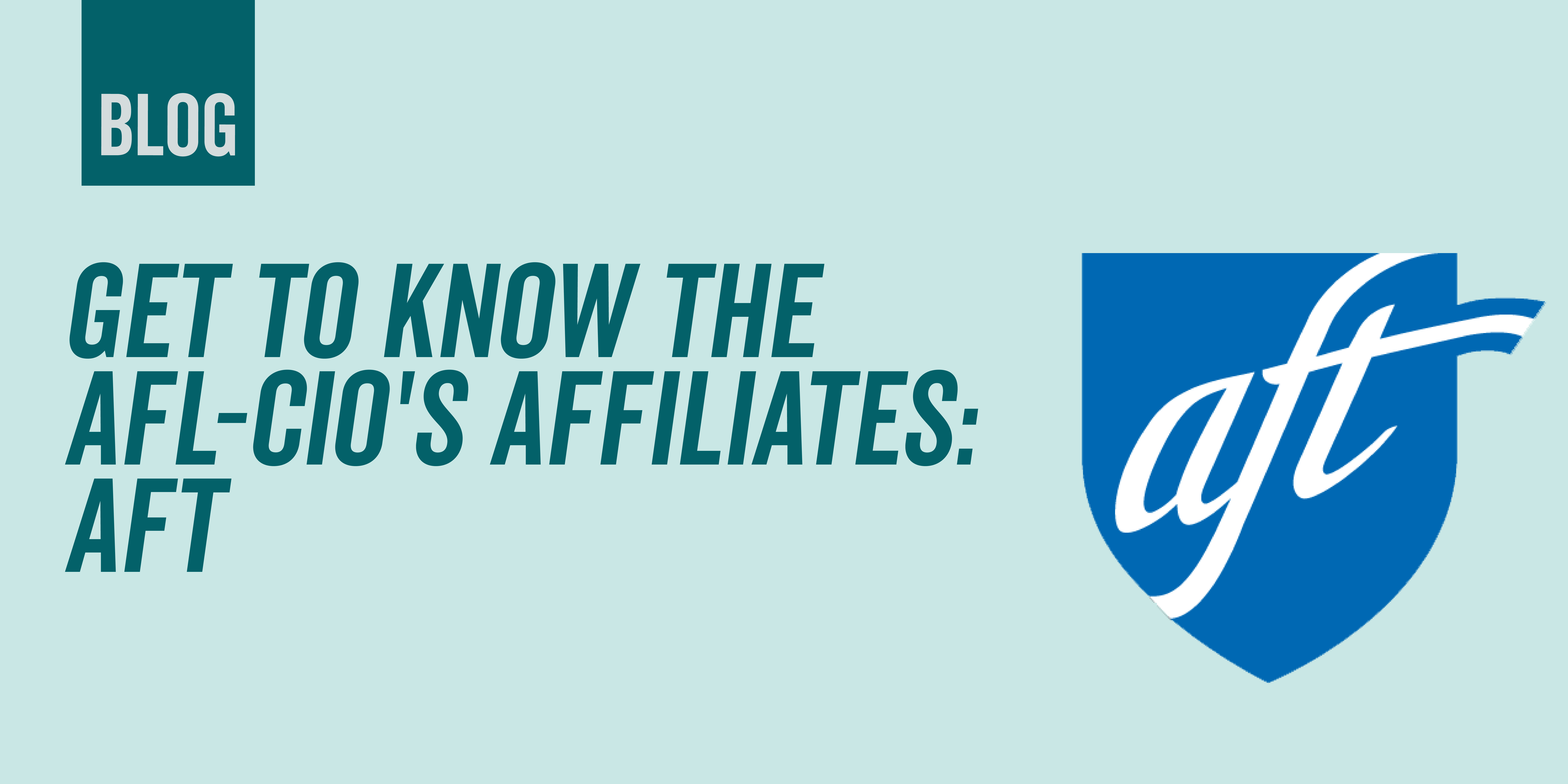
Next up in our series that will take a deeper look at each of our affiliates is the AFT. The series will run weekly until we've covered all 55 of our affiliates.
Name of Union: American Federation of Teachers
Mission: The AFT "is a union of professionals that champions fairness; democracy; economic opportunity; and high-quality public education, health care and public services for our students, their families and our communities. We are committed to advancing these principles through community engagement, organizing, collective bargaining and political activism, and especially through the work our members do."
Current Leadership of Union: Randi Weingarten was elected president of AFT in 2008 after serving for 12 years as the president of the United Federation of Teachers, representing 200,000 educators in New York City's public schools. After graduating from Cornell University’s School of Industrial and Labor Relations and the Cardozo School of Law, she worked as a lawyer and was active in numerous professional, civic and philanthropic organizations. Weingarten also taught history at Clara Barton High School in Brooklyn before becoming UFT's assistant secretary in 1995 and treasurer two years later.
Lorretta Johnson serves as secretary-treasurer and Mary Cathryn Ricker serves as executive vice president. The AFT also has 42 vice presidents representing various geographic areas.
Current Number of Members: 1.7 million.
Members Work As: Teachers from pre-kindergarten through 12th grade; paraprofessionals and other school-related personnel; faculty and professional staff in higher education; nurses and other health care professionals; early childhood educators; and federal, state and local government employees.
Industries Represented: Public schools, higher education, health care and federal, state and local government.
History: The AFT was founded in Chicago and was chartered by the American Federation of Labor in 1916. It grew quickly, chartering more than 170 locals in the first four years. A post-World War I push from local school boards intimidated many members into leaving the union, cutting its size in half by the end of the 1930s. The AFT fought back and pushed for academic freedom and tenure laws to protect teachers during the Red Scare. By the end of the Great Depression, the AFT had secured tenure laws of some sort in 17 states.
During World War II, the AFT was a significant supporter of the war effort while also campaigning against oppression of people of color at home. The AFT also fought to improve conditions in schools. Another Red Scare came along in the 1950s and the AFT took a lead role in opposing loyalty oaths and other limitations on teachers. The AFT was active in the civil rights movement, in particular in support of school desegregation. As the 1960s unfolded, the AFT turned toward strikes to obtain better pay, benefits and job security. More than 300 teacher strikes took place in the 1960s, and membership more than doubled to 200,000 by the end of the decade.
While dealing with new issues in the 1970s like declining school funding in urban areas, the AFT was the fastest-growing union in the country; and by the 1980s, it led the movement toward education reform and teacher professionalization. Throughout the ensuing decades, the AFT continued to focus on innovation and making sure that teachers had the cutting-edge skills to best serve their students.
In the 2000s, the AFT surpassed a million members, with the total hitting 1.7 million in 2017. During the presidency of Randi Weingarten, the AFT has continued to innovate with major initiatives such as the AFT Innovation Fund, Reconnecting McDowell, Share My Lesson and a partnership with First Book.
The past few years have seen an inspiring rise in collective action in the United States, and teachers, led by members of the AFT, have engaged in a wave of strikes that have scored a series of important victories for edcuators and the students and communities they serve. In particular, teachers were successful using their collective voices in West Virginia, Oklahoma City, Chicago and Los Angeles.
Current Campaigns: A Decade of Neglect shines a light on the underfunding of public schools, and Fund Our Future seeks to remedy that problem. It is also working to help members deal with the burdens of the Student Debt Crisis. The AFT is fighting to keep families together in the face of "zero tolerance" immigration policies, to stop student loan fraud, to arm schools with resources instead of guns and to support Puerto Rico's teachers and parents.
Community Efforts: I Am AFT spotlights the community efforts of members. The AFT also provides disaster relief and emergency preparedness for members, its families and communities. The AFT also works with various community partners, including the Alliance to Reclaim Our Schools, First Book, the Food Research and Action Center, the Special Olympics, the BlueGreen Alliance and the Healthy Schools Campaign.

